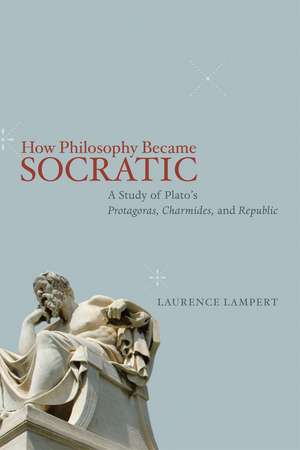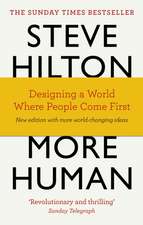How Philosophy Became Socratic: A Study of Plato's "Protagoras," "Charmides," and "Republic"
Autor Laurence Lamperten Limba Engleză Paperback – 25 mar 2013
Plato’s dialogues show Socrates at different ages, beginning when he was about nineteen and already deeply immersed in philosophy and ending with his execution five decades later. By presenting his model philosopher across a fifty-year span of his life, Plato leads his readers to wonder: does that time period correspond to the development of Socrates’ thought? In this magisterial investigation of the evolution of Socrates’ philosophy, Laurence Lampert answers in the affirmative.
The chronological route that Plato maps for us, Lampert argues, reveals the enduring record of philosophy as it gradually took the form that came to dominate the life of the mind in the West. The reader accompanies Socrates as he breaks with the century-old tradition of philosophy, turns to his own path, gradually enters into a deeper understanding of nature and human nature, and discovers the successful way to transmit his wisdom to the wider world. Focusing on the final and most prominent step in that process and offering detailed textual analysis of Plato’s Protagoras, Charmides, and Republic, How Philosophy Became Socratic charts Socrates’ gradual discovery of a proper politics to shelter and advance philosophy.
Preț: 352.07 lei
Nou
Puncte Express: 528
Preț estimativ în valută:
67.39€ • 73.23$ • 56.64£
67.39€ • 73.23$ • 56.64£
Carte tipărită la comandă
Livrare economică 22 aprilie-06 mai
Preluare comenzi: 021 569.72.76
Specificații
ISBN-13: 9780226006284
ISBN-10: 022600628X
Pagini: 452
Dimensiuni: 152 x 229 x 30 mm
Greutate: 0.52 kg
Editura: University of Chicago Press
Colecția University of Chicago Press
ISBN-10: 022600628X
Pagini: 452
Dimensiuni: 152 x 229 x 30 mm
Greutate: 0.52 kg
Editura: University of Chicago Press
Colecția University of Chicago Press
Notă biografică
Laurence Lampert is emeritus professor of philosophy at Indiana University–Purdue University Indianapolis. He is the author of four other books, including Leo Strauss and Nietzsche, also published by the University of Chicago Press, and Nietzsche and Modern Times: A Study of Bacon, Descartes, and Nietzsche.
Cuprins
Introduction
PART ONE
PART ONE
Philosophy in a Time of Splendor: Socrates in Periclean Athens before the War, c. 433
CHAPTER 1. Protagoras: Socrates and the Greek Enlightenment
Prologue: Great Protagoras
1. First Words
2. The Frame Conversation
3. Socrates with a Young Athenian
4. Socrates in Hades
5. Protagoras Introduces Himself
6. Socrates’ Challenge and Invitation: Can the Political Art Be Taught?
7. Protagoras’s Display Speech: Why the Political Art Is Teachable
8. Socrates’ Display Speech, Part I: The Wise Must Teach That Virtue Is Unitary
9. Socrates Stages a Crisis
10. Socrates’ Display Speech, Part II: A Wiser Stance toward the Wise
11. Alcibiades Presides
12. Socrates’ Display Speech, Part III: A Wiser Stance toward the Many
13. The Final Tribunal: Courage and Wisdom
14. Socrates the Victor
15. Last Words
16. Socrates’ Politics for Philosophy in 433
Note on the Dramatic Date of Protagoras and Alcibiades I
PART TWO
CHAPTER 1. Protagoras: Socrates and the Greek Enlightenment
Prologue: Great Protagoras
1. First Words
2. The Frame Conversation
3. Socrates with a Young Athenian
4. Socrates in Hades
5. Protagoras Introduces Himself
6. Socrates’ Challenge and Invitation: Can the Political Art Be Taught?
7. Protagoras’s Display Speech: Why the Political Art Is Teachable
8. Socrates’ Display Speech, Part I: The Wise Must Teach That Virtue Is Unitary
9. Socrates Stages a Crisis
10. Socrates’ Display Speech, Part II: A Wiser Stance toward the Wise
11. Alcibiades Presides
12. Socrates’ Display Speech, Part III: A Wiser Stance toward the Many
13. The Final Tribunal: Courage and Wisdom
14. Socrates the Victor
15. Last Words
16. Socrates’ Politics for Philosophy in 433
Note on the Dramatic Date of Protagoras and Alcibiades I
PART TWO
Philosophy in a Time of Crisis: Socrates’ Return to War-Ravaged, Plague-Ravaged Athens, Late Spring 429
CHAPTER 2. Charmides: Socrates’ Philosophy and Its Transmission
Prologue: The Return of Socrates
1. First Words
2. Socrates’ Intentions
3. The Spectacle of Charmides’ Entrance
4. Critias Scripts a Play but Socrates Takes It Over
5. Stripping Charmides’ Soul
6. What Critias Took from Socrates and What That Riddler Had in Mind
7. Should Each of the Beings Become Clearly Apparent Just As It Is?
8. The Final Definition of Sôphrosunê, Socrates’ Definition
9. The Possibility of Socrates’ Sôphrosunê
10. The Benefit of Socrates’ Sôphrosunê
11. Socrates Judges the Inquiry
12. Last Words
13. Who Might the Auditor of Plato’s Charmides Be?
Note on the Dramatic Date of Charmides
CHAPTER 3. The Republic: The Birth of Platonism
Prologue: Socrates’ Great Politics
One: The World to Which Socrates Goes Down
1. First Words
2. The Compelled and the Voluntary
3. Learning from Cephalus
4. Polemarchus and Socratic Justice
5. Gentling Thrasymachus
6. The State of the Young in Athens
Two: Socrates’ New Beginning
7. New Gods
8. New Philosophers
9. New Justice in a New Soul
10. Compulsion and Another Beginning
11. The Center of the Republic: The Philosopher Ruler
12. Glaucon, Ally of the Philosopher’s Rule
13. Platonism: Philosophy’s Political Defense and Introduction to Philosophy
14. Public Speakers for Philosophy
15. Images of the Greatest Study: Sun, Line, Cave
Three: The Last Act of the Returned Odysseus
16. Love and Reverence for Homer
17. Homer’s Deed
18. Homer’s Children
19. Rewards and Prizes for Socrates’ Children
20. Replacing Homer’s Hades
21. Last Words
Note on the Dramatic Date of the Republic
Epilogue
Works Cited
Index
CHAPTER 2. Charmides: Socrates’ Philosophy and Its Transmission
Prologue: The Return of Socrates
1. First Words
2. Socrates’ Intentions
3. The Spectacle of Charmides’ Entrance
4. Critias Scripts a Play but Socrates Takes It Over
5. Stripping Charmides’ Soul
6. What Critias Took from Socrates and What That Riddler Had in Mind
7. Should Each of the Beings Become Clearly Apparent Just As It Is?
8. The Final Definition of Sôphrosunê, Socrates’ Definition
9. The Possibility of Socrates’ Sôphrosunê
10. The Benefit of Socrates’ Sôphrosunê
11. Socrates Judges the Inquiry
12. Last Words
13. Who Might the Auditor of Plato’s Charmides Be?
Note on the Dramatic Date of Charmides
CHAPTER 3. The Republic: The Birth of Platonism
Prologue: Socrates’ Great Politics
One: The World to Which Socrates Goes Down
1. First Words
2. The Compelled and the Voluntary
3. Learning from Cephalus
4. Polemarchus and Socratic Justice
5. Gentling Thrasymachus
6. The State of the Young in Athens
Two: Socrates’ New Beginning
7. New Gods
8. New Philosophers
9. New Justice in a New Soul
10. Compulsion and Another Beginning
11. The Center of the Republic: The Philosopher Ruler
12. Glaucon, Ally of the Philosopher’s Rule
13. Platonism: Philosophy’s Political Defense and Introduction to Philosophy
14. Public Speakers for Philosophy
15. Images of the Greatest Study: Sun, Line, Cave
Three: The Last Act of the Returned Odysseus
16. Love and Reverence for Homer
17. Homer’s Deed
18. Homer’s Children
19. Rewards and Prizes for Socrates’ Children
20. Replacing Homer’s Hades
21. Last Words
Note on the Dramatic Date of the Republic
Epilogue
Works Cited
Index






